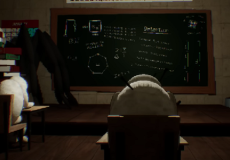

That’s Not My Neighbor Campaign Mode
Advertisement
That’s Not My Neighbor campaign mode expands the short encounters of the original game into a continuous week-long sequence. The player takes the position of a doorman who must identify real residents and reject disguised intruders. Every action builds a chain of consequences that affect later days. The campaign introduces progress saving, longer decision arcs, and a deeper focus on observation. Each wrong judgment reshapes how future visitors behave and determines the direction of the ending.
Advertisement
Similiar games
That’s Not My Neighbor campaign mode expands the short encounters of the original game into a continuous week-long sequence. The player takes the position of a doorman who must identify real residents and reject disguised intruders. Every action builds a chain of consequences that affect later days. The campaign introduces progress saving, longer decision arcs, and a deeper focus on observation. Each wrong judgment reshapes how future visitors behave and determines the direction of the ending.
Progression And Daily Routine
The campaign is structured around a seven-day schedule where each shift changes the tone and complexity of the tasks. The first day works as an introduction, while later days test memory and awareness. Rules become stricter, and the number of suspicious cases increases. New dialogues and unexpected questions appear, forcing players to notice details in identification cards, photos, and facial expressions. This setup transforms routine checking into a layered investigation.
Core Features
Compared to quick-play sessions, campaign mode adds systems that connect events over time. It uses automatic saving, new dialogue lines, and branching results based on accuracy. Players face small exams and verification rounds that adjust depending on past performance. To summarize the main elements:
· Seven consecutive in-game days with cumulative outcomes
· Automatic saves between sessions
· Repeating visitors and altered dialogues
· Tests that modify future tasks
· Endings unlocked by precision or mistake count
Endings And Consequences
Outcomes vary from official recognition to total failure. Good performance leads to survival or promotion, while consistent errors may end in arrest or dismissal. Some endings reveal hidden details about the organization and its control methods. Others question the doorman’s perception of reality. Each path is shaped not by chance but by the total record of daily results. The player’s discipline and patience define how the story closes.
Community And Reception
Players describe the campaign as a more deliberate interpretation of the core idea. Discussions often focus on discovering all endings and testing how small choices alter later scenes. Streamers highlight the tension of returning to work after a wrong decision from the previous day. This mode changes the flow of That’s Not My Neighbor from isolated rounds into a connected story about trust and control, where every judgment leaves a trace that cannot be undone.
Discuss That’s Not My Neighbor Campaign Mode




















